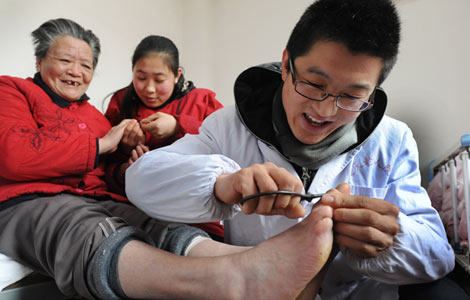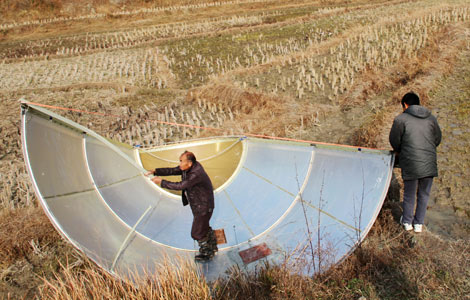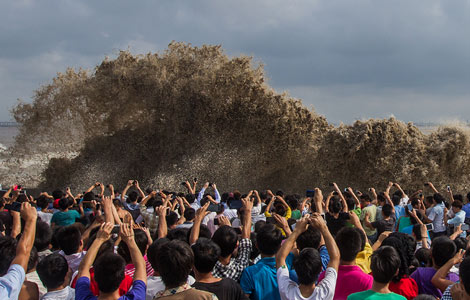IPR courts 'would be helpful'
Updated: 2013-12-23 00:14
By Wang Zhenghua in Singapore and Wang Xin in Beijing (China Daily)
|
||||||||
Judges with specialized knowledge in growing need as caseloads increase
China is moving in the right direction by pledging to set up dedicated courts for intellectual property rights cases, a senior United Nations official has said.
Proper legislation for IPR protection is already in place, and specialized courts will help judges become more proficient in handling complex cases, Johannes Christian Wichard, deputy director-general of the World Intellectual Property Organization, said in an interview in Singapore.
"It is helpful whether you do it in a specific court or do it by assigning IPR cases always to the same one chamber within a court," he said. "IPR issues concern quite a specific area of the law. They can be quite complex. For example, if you deal with a patent dispute, you don't have to be a technician but you must have the technical understanding."
Under the present legal framework, IPR lawsuits are heard by a tribunal for civil trials or by a court's IPR division.
In a reform blueprint by the Third Plenum of the 18th Central Committee of the Communist Party of China in November, leaders vowed to explore ways of setting up dedicated IPR courts.
The proposal came amid a surge in IPR lawsuits and a growing awareness of intangible assets.
In a white paper released in April, the Supreme People's Court said courts nationwide handled 83,850 civil lawsuits involving IPR in 2012, up 44.1 percent year-on-year.
There is a clear trend worldwide for judges to be at least specialized in IPR issues, even if a country has not set up a dedicated court, the UN official said.
Germany, for example, has a specialized federal court dealing with validity cases and a limited number of commercial tribunals to handle patent-related infringement disputes.
"They are very popular," Wichard said, explaining they decide more patent infringement disputes than the courts in the other European Union nations combined.
"Even cases not really involving two German companies, but just having one element in Germany, are tried in the courts because people get good judges and a reasonable price," he said.
The United States, Japan, Russia and Finland also have courts that handle IPR issues, especially patent disputes, which require profound technical knowledge.
The possibility of China establishing IPR courts has been discussed for several years, but the Supreme People's Court has not released a timetable on when they may be rolled out, according to Xinhua News Agency.
Legal experts said a special court to handle the rising number of disputes is necessary. However, they also warn that such a move may result in major power shifts between administrative agencies and the Ministry of Justice.
"The courts will be very helpful because at least the court decisions will be more consistent," said Cyril Chua, a partner of Singapore-based international law firm Bird & Bird.
Ha Si, a lawyer in Beijing who covered the IPR sector for nearly 20 years, said judges in China's developed areas are more experienced in dealing with IPR cases than those in underdeveloped regions.
"Founding a new court will help unify decisions on key issues for trial, paving the way for proper enforcement," she said.
China has more than 30 high courts at provincial level that are responsible for dealing with IPR appeals in their regions.
Li Shunde, deputy director of the Chinese Academy of Social Sciences' Intellectual Property Center, said the ability to enforce decisions can vary considerably.
To reduce the gap, "we proposed creating a special IPR court to handle appeals, something like the US Court of Appeals for the Federal Circuit", Li said.
However, he added, given the growing number of IPR cases, it could be too much for just one unified court of appeal to deal with cases from around China, so another option is to establish four to five courts in different regions.
Contact writers at wangzhenghua@chinadaily.com.cn and wangxin@chinadaily.com.cn

 A man and a child jump off Manhattan building
A man and a child jump off Manhattan building
 Male nurses in demand as caregivers for elderly
Male nurses in demand as caregivers for elderly
 Moving beyond language skills
Moving beyond language skills
 Khodorkovsky says he will not enter Russian politics
Khodorkovsky says he will not enter Russian politics
 Debris of Bolivian satellite falls on E China
Debris of Bolivian satellite falls on E China
 Migrating cranes at Israel's Hula Lake
Migrating cranes at Israel's Hula Lake
 Reviving the 'river pig'
Reviving the 'river pig'
 Smiles give way to dials
Smiles give way to dials
Most Viewed
Editor's Picks

|

|

|

|

|

|
Today's Top News
Committee of 100 seeks to tackle 'sensitive' images about China
IPR courts 'would be helpful'
GM corn rejection no to hurt market
Liaoning's combat capability tested
Sotheby's denies $8m work is fake
Castro urges US to respect differences with Cuba
Student wounded in school shooting dies
US aircraft hit by gunfire in S. Sudan
US Weekly

|

|






